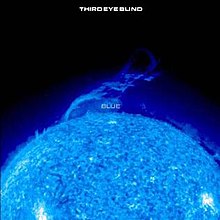Blue (Third Eye Blind album)
| Blue | ||||
|---|---|---|---|---|
 |
||||
| Studio album by Third Eye Blind | ||||
| Released | November 23, 1999 | |||
| Recorded | 1999 | |||
| Genre | Alternative rock, post-grunge | |||
| Length | 57:59 | |||
| Label | Elektra | |||
| Producer | Stephan Jenkins, Arion Salazar, and Third Eye Blind | |||
| Third Eye Blind chronology | ||||
|
||||
| Singles from Blue | ||||
|
||||
| Professional ratings | |
|---|---|
| Review scores | |
| Source | Rating |
| AllMusic | |
| Entertainment Weekly | B+ |
| Robert Christgau | |
| Rolling Stone | |
| Spin | |
Blue is the second studio album by American rock band Third Eye Blind, released on November 23, 1999. The album's creation was difficult, namely due to power struggles and arguments between frontman Stephan Jenkins and lead guitarist Kevin Cadogan, leading to a quick but isolated recording experience between members. The album was generally well received by critics, and was certified platinum by the RIAA, but performed below the band's prior album, the multi-platinum Third Eye Blind. While managing to stay together for the creation of the album, shortly after its release, the band fired Cadogan, touring in support of the album with replacement guitarist Tony Fredianelli. As such, the album was the last to feature Cadogan, and the last to be released without significant gaps and delays prior to release.
The band enjoyed extensive success in 1997 with their first album, Third Eye Blind, which eventually went platinum six times. The band maintained popularity into 1998 through extensive touring and a number of singles that performed well in the charts, including "Semi-Charmed Life," "How's It Going to Be," "Graduate," "Losing a Whole Year," and "Jumper," but by the end of the year, the band looked to start working on new material.
In promoting the album, frontman and lead vocalist Stephan Jenkins recounted a pleasant experience in recording the album, referring to it as "too much fun and feeling like...a complete recording group for the first time...We had these jam sessions that were fun". He also commented that it had been more collaborative than their prior album; bassist Arion Salazar became more involved in the writing and production, while drummer Brad Hargreaves was involved in the creative process for the first time, as he had joined the band late into their sessions for the first album. However, in retrospect, Jenkins painted a much more grim picture, citing time constraints, label pressure from Elektra Records, and isolation between members, stating:
...
Wikipedia
